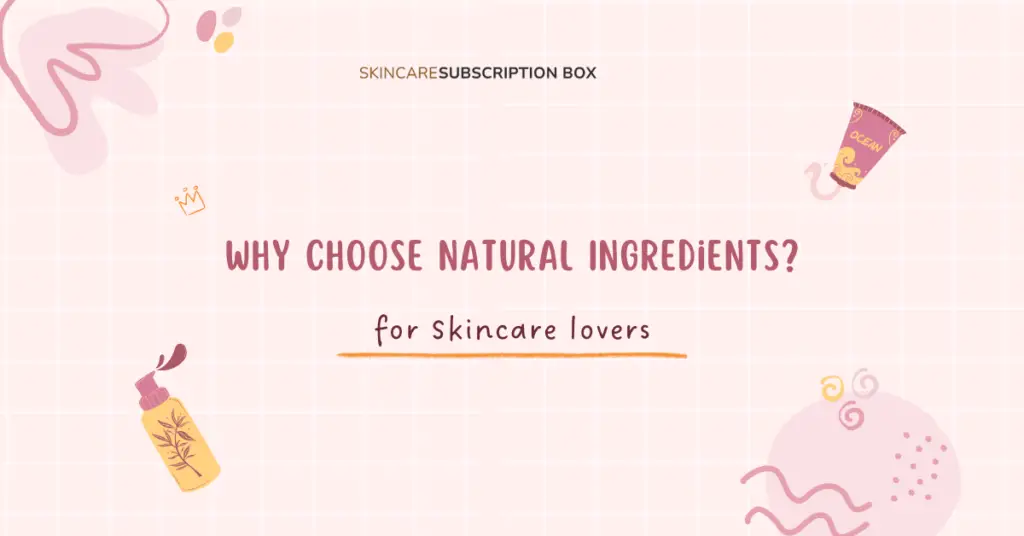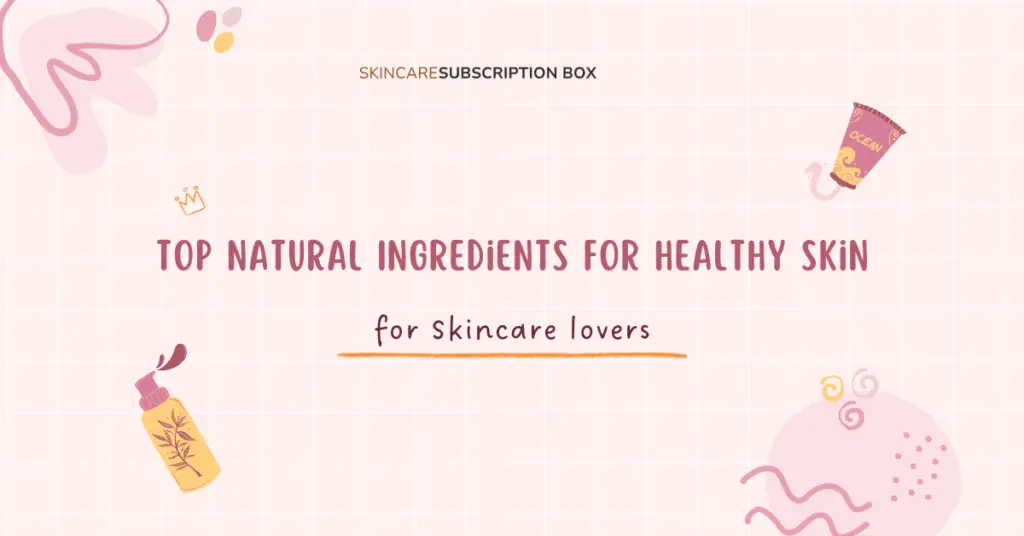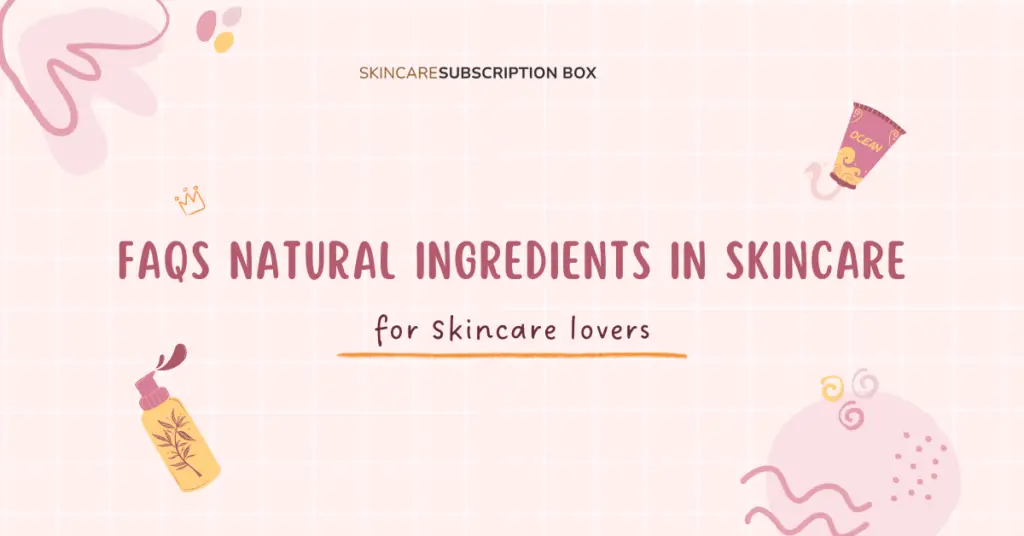
In a world where skincare trends constantly evolve, one thing remains timeless: the desire for healthy, glowing skin. More people are turning to natural skincare ingredients to achieve this, seeking alternatives to synthetic products filled with chemicals. These natural ingredients offer numerous benefits, making them a popular choice for those who care deeply about what they put on their skin.
Natural skincare isn’t just a passing trend; it’s a movement towards healthier and more sustainable beauty routines. Natural ingredients are gentle on the skin, reduce the risk of irritation, and are often packed with beneficial nutrients. Moreover, they are eco-friendly, supporting a more sustainable lifestyle.
In this article, we’ll explore some of the best natural ingredients for skin health. Whether you’re dealing with dryness, acne, or just want to maintain a radiant complexion, these ingredients can help. I’ll cover a variety of options, from well-known favorites like aloe vera and coconut oil to less common but equally powerful choices like green tea extract and jojoba oil.
By the end of this guide, you’ll have a better understanding of how to incorporate these natural ingredients into your skincare routine. You’ll learn about their benefits, how to use them, and what makes them stand out in the crowded world of beauty products. So, let’s go into the world of natural skincare and discover how you can enhance your skin’s health and beauty the natural way.
Disclaimer: This post contain affiliate links for products recommendation which helps our platform earn some commission that ultimately keeps us producing more meaningful content and discoveries for our users. The information on the Skincare Subscription Box should only be taken for informational purposes and used solely as reference material. While we strive to offer accurate and up-to-date advice, skincare industry trends change regularly, and individual skin concerns vary significantly; our recommendations and opinions regarding skincare products and subscription boxes are formed based on extensive research, expert insights, and personal experience. Read full disclaimer here
Why Choose Natural Ingredients?

Choosing natural skincare ingredients is not just a trend; it’s a smart decision for anyone who wants healthier, more radiant skin. Here’s why natural ingredients are a superior choice:
Gentle on the Skin
When it comes to the skin, natural ingredients are typically kinder than synthetic ones. Many commercial skincare products contain harsh chemicals that can cause irritation, dryness, or allergic reactions. Natural ingredients, however, are often more compatible with our skin’s natural chemistry, reducing the risk of adverse effects.
Packed with Nutrients
Rich in vitamins, minerals, and antioxidants, natural components protect and nourish skin. Aloe vera, for example, is a rich source of vitamins A, C, and E that aid in skin renewal. Coconut oil is rich in fatty acids that provide deep hydration, while green tea extract offers potent antioxidants that fight free radicals and reduce inflammation.
Fewer Side Effects
Using natural skincare ingredients reduces the likelihood of side effects. Synthetic chemicals can disrupt the skin’s natural balance and lead to issues like redness, peeling, and breakouts. Natural ingredients, on the other hand, are typically well-tolerated and can even help to soothe and heal irritated skin.
Environmentally Friendly
Natural skincare ingredients are not only good for your skin but also for the environment. They are biodegradable and have a smaller carbon footprint compared to synthetic ingredients, which often require extensive processing and can leave harmful residues. By choosing natural products, you support sustainable practices and reduce your ecological impact.
Transparency and Trust
Many natural skincare brands prioritize transparency about their ingredients. This means you can easily understand what you are putting on your skin, avoiding hidden chemicals and additives. Knowing the source and benefits of each ingredient can help you make informed choices about your skincare routine.
Growing Demand and Innovation
The demand for natural skincare products has led to significant innovation in the beauty industry. Brands are investing in research to discover new plant-based ingredients and develop more effective formulations. This means you have access to a wider variety of high-quality natural products than ever before.
Summary of Benefits:
- Gentle and compatible with skin: Less irritation and fewer allergic reactions.
- Nutrient-rich: Packed with vitamins, minerals, and antioxidants.
- Minimal side effects: Natural ingredients are typically well-tolerated.
- Eco-friendly: Supports sustainable and environmentally friendly practices.
- Transparent and trustworthy: Clear ingredient lists and fewer hidden chemicals.
- Innovative and diverse: Expanding options due to increased demand.
Choosing natural ingredients for your skincare routine is a step towards healthier skin and a healthier planet. These benefits make it clear why more people are making the switch to natural beauty products. In the next section, I will list specific natural ingredients that can transform your skincare regimen.
Top Natural Ingredients for Healthy Skin

Natural skincare ingredients offer a variety of benefits, catering to different skin types and concerns. Here are some of the best natural ingredients to consider incorporating into your skincare routine:
Aloe Vera
Aloe vera is well known for its restorative and calming qualities. This natural ingredient is packed with vitamins A, C, and E, making it an excellent choice for moisturizing and rejuvenating the skin. It’s particularly effective for soothing sunburns and reducing inflammation. Aloe vera can be used directly from the plant or found in many skincare products such as gels and creams.
Coconut Oil
Coconut oil is a versatile and deeply hydrating ingredient. Rich in fatty acids, it provides excellent moisture and helps to create a protective barrier on the skin. Coconut oil also has antibacterial properties, making it useful for treating minor cuts and preventing infections. It works well as a makeup remover, moisturizer, and even in DIY face masks.
Honey
Since honey is a naturally occurring humectant, it aids in the skin’s ability to retain moisture. It also has antibacterial and antioxidant properties, making it ideal for treating acne and promoting a healthy complexion. You can use honey as a face mask, spot treatment, or mixed with other ingredients for added benefits. Because of its delicate nature, it can be used on all skin types.
Tea Tree Oil
Tea tree oil is well-known for its potent antibacterial and anti-inflammatory properties. It’s particularly effective in treating acne and blemishes. However, it’s important to dilute tea tree oil with a carrier oil, such as jojoba or coconut oil, to prevent skin irritation. You can add a few drops to your toner or moisturizer for targeted treatment.
Rosehip Oil
Rosehip oil is a powerhouse of vitamins A and C, which are essential for skin regeneration and brightening. This oil helps to reduce scars, fine lines, and hyperpigmentation. It’s lightweight and absorbs quickly, making it suitable for all skin types, especially mature or damaged skin. Use it as a facial oil or add a few drops to your favorite moisturizer.
Jojoba Oil
Jojoba oil is a great moisturizer that doesn’t clog pores because it closely mimics the skin’s natural sebum. It’s non-comedogenic and suitable for all skin types, including oily and combination skin.You can use jojoba oil as a moisturizer on its own or as a carrier oil for essential oils. It’s also effective in balancing oil production.
Green Tea Extract
Antioxidants included in green tea extract, especially catechins, help shield the skin from harm and lessen inflammation. It’s great for soothing redness and irritation. You can find green tea extract in toners, serums, and face masks. It’s suitable for all skin types, especially sensitive and acne-prone skin.
Shea Butter
Shea butter is deeply moisturizing and packed with vitamins A and E, which promote skin healing and protection. It’s especially advantageous for skin that is sensitive and dry. Shea butter can be used as a body moisturizer, in lip balms, and in rich facial creams. Its anti-inflammatory properties also make it helpful for soothing irritated skin.
Oatmeal
Oatmeal is a gentle, natural exfoliant that also soothes and hydrates the skin. It’s ideal for relieving dryness and irritation. Oatmeal can be used as a soothing bath soak or in DIY face masks. It’s suitable for all skin types, particularly for those with sensitive or irritated skin.
Summary of Top Natural Ingredients:
- Aloe Vera: Soothes and heals; great for moisturizing and reducing inflammation.
- Coconut Oil: Deeply hydrating and antibacterial; versatile for multiple uses.
- Honey: Moisture-retaining, antibacterial, and antioxidant-rich.
- Tea Tree Oil: Antibacterial and anti-inflammatory; effective for acne treatment.
- Rosehip Oil: Vitamin-rich; reduces scars and brightens skin.
- Jojoba Oil: Non-comedogenic moisturizer; balances oil production.
- Green Tea Extract: Antioxidant-rich; soothes redness and irritation.
- Shea Butter: Deeply moisturizing and protective; ideal for dry skin.
- Oatmeal: Gentle exfoliant; soothes and hydrates.
Incorporating these natural ingredients into your skincare routine can help you achieve healthier, more radiant skin. Each ingredient offers unique benefits, making it easy to find options that suit your specific needs and preferences.
How to Incorporate Natural Ingredients into Your Skincare Routine

Using natural components in your skincare routine can improve the appearance and health of your skin. Here’s a guide on how to effectively use these ingredients:
Start with a Simple Routine
If you’re new to natural skincare, start with a basic routine and gradually introduce new ingredients. A simple routine typically includes cleansing, toning, and moisturizing.
- Cleansing: Use a gentle cleanser with natural ingredients like oatmeal or honey. Your skin will still be cleansed by these chemicals without losing its natural oils.
- Toning: Green tea extract or rose water makes excellent natural toners. They soothe the skin and prepare it for moisturizing.
- Moisturizing: Choose a natural oil such as jojoba or rosehip oil. These oils hydrate and nourish the skin, leaving it soft and smooth.
DIY Face Masks
Homemade face masks are a fantastic way to incorporate natural ingredients into your routine. Here are a few simple recipes:
- Hydrating Honey Mask: Mix one tablespoon of honey with a teaspoon of aloe vera gel. Apply to your face, leave for 15-20 minutes, and rinse off with warm water.
- Soothing Oatmeal Mask: Combine two tablespoons of ground oatmeal with enough water to form a paste. Apply to your face, leave for 10-15 minutes, and rinse off.
- Brightening Green Tea Mask: Mix one tablespoon of green tea powder with a tablespoon of honey. Apply to your face, leave for 15 minutes, and rinse off with warm water.
Spot Treatments
For targeted skincare concerns, natural ingredients can be used as spot treatments. For instance, tea tree oil does wonders in the treatment of acne Dilute a few drops of tea tree oil in a carrier oil like jojoba oil and apply directly to blemishes with a cotton swab.
Moisturizing and Hydration
Natural oils are fantastic moisturizers. They provide deep hydration without clogging pores. Here’s how to use them:
- Facial Oils: After cleansing and toning, apply a few drops of rosehip or jojoba oil to your face. These oils are lightweight and absorb quickly, making them perfect for daily use.
- Body Moisturizers: Shea butter and coconut oil are great for moisturizing the body. Apply them to damp skin after a shower to lock in moisture.
Exfoliation
Frequent exfoliation encourages a brighter complexion by assisting in the removal of dead skin cells. Natural exfoliants like oatmeal or sugar can be used to create gentle scrubs.
- Oatmeal Scrub: Mix ground oatmeal with a bit of water to create a paste. Apply with gentle circular strokes to your face, then rinse off.
- Sugar Scrub: Combine sugar with coconut oil for a hydrating body scrub. To hydrate and exfoliate your skin, use it in the shower.
Reading Labels and Choosing Products
When buying natural skincare products, it’s important to read labels carefully. Look for products that list natural ingredients at the top and avoid those with long lists of synthetic chemicals. Brands that emphasize transparency and sustainability are usually good choices.
DIY Recipes and Tips
Trying out new homemade dishes can be enjoyable and fulfilling. However, always do a patch test before applying any new ingredient to your face to ensure you don’t have an allergic reaction.
- Patch Test: Apply a small amount of the ingredient to your inner wrist and wait 24 hours to see if any irritation occurs.
- Storage: Keep natural ingredients like oils and honey in a cool, dark place to maintain their efficacy.
Summary of Incorporation Tips:
- Start simple: Cleanse, tone, and moisturize with natural ingredients.
- DIY masks and treatments: Create homemade masks and spot treatments.
- Use natural oils: Hydrate with facial and body oils.
- Regular exfoliation: Exfoliate with oatmeal or sugar scrubs.
- Read labels: Choose products with clear, natural ingredient lists.
- Patch test: Always test new ingredients for allergies.
By following these tips, you can easily incorporate natural ingredients into your skincare routine, achieving healthy, radiant skin naturally and effectively.
Potential Risks and Considerations

While natural ingredients are generally beneficial for the skin, it’s important to be aware of potential risks and considerations to ensure you use them safely and effectively.
Allergies and Sensitivities
Natural ingredients can still cause allergic reactions or sensitivities in some people. Something is not always safe for everyone, even if it is naturally occurring.
- Patch Testing: Always perform a patch test before using a new ingredient. Apply a small amount to your inner wrist or behind your ear and wait 24 hours to check for any adverse reactions.
- Common Allergens: Ingredients like essential oils, nut-based oils, and even certain plant extracts can trigger allergies. If you have a known allergy, proceed with caution.
Quality and Purity
Not all natural ingredients are created equal. The quality and purity of an ingredient can significantly impact its effectiveness and safety.
- Sourcing: Ensure that you purchase natural ingredients from reputable sources. Look for organic and cold-pressed options when possible.
- Adulteration: Some products labeled as “natural” might still contain synthetic additives or contaminants. Prior to purchasing, thoroughly read labels and do brand research.
Proper Use and Dilution
Certain natural ingredients, particularly essential oils, can be potent and should be used correctly to avoid irritation or harm.
- Dilution: Essential oils should never be applied directly to the skin. Dilute them with a carrier oil such as jojoba or coconut oil before use.
- Usage Guidelines: Follow recommended usage guidelines for each ingredient. For example, tea tree oil should be used sparingly and never ingested.
Storage and Shelf Life
Natural ingredients can degrade over time, losing their efficacy or becoming harmful.
- Proper Storage: Store natural ingredients in a cool, dark place to prolong their shelf life. Oils should be kept in dark glass bottles to protect them from light.
- Expiration Dates: Be mindful of expiration dates. Natural products can spoil, and using expired ingredients can cause skin irritation or infection.
Individual Skin Types and Conditions
Since each person’s skin type is unique, what works for one person might not work for another.
- Personalization: Tailor your skincare routine to your specific skin type and concerns. For example, coconut oil might be too heavy for oily skin but perfect for dry skin.
- Consultation: If you have a chronic skin condition like eczema or psoriasis, consult with a dermatologist before trying new natural ingredients.
Potential for Overuse
Using too many products or ingredients at once can overwhelm your skin, leading to irritation or breakouts.
- Simplicity: Start with a simple routine and gradually introduce new ingredients. Observe when your skin reacts, then make the necessary adjustments.
- Moderation: Use potent ingredients, such as exfoliants and essential oils, in moderation to avoid over-exfoliating or irritating your skin.
Summary of Potential Risks and Considerations:
- Allergies and Sensitivities: Always patch test new ingredients.
- Quality and Purity: Choose high-quality, reputable sources.
- Proper Use and Dilution: Follow usage guidelines and dilute potent ingredients.
- Storage and Shelf Life: Store correctly and be aware of expiration dates.
- Individual Skin Types: Customize your routine and consult a dermatologist if needed.
- Potential for Overuse: Introduce new ingredients gradually and use in moderation.
By being aware of these potential risks and considerations, you can safely enjoy the benefits of natural skincare ingredients and achieve healthier, more radiant skin.
Conclusion

There are several advantages to using natural skincare components to get healthy, glowing skin. By harnessing the power of nature, you can nourish and protect your skin without exposing it to harsh chemicals or synthetic additives. Throughout this guide, we’ve explored the numerous advantages of incorporating natural ingredients into your skincare routine:
- Gentle and Effective: Natural ingredients are gentle on the skin while still providing powerful benefits such as hydration, soothing, and rejuvenation.
- Environmentally Friendly: Choosing natural products supports sustainable practices and reduces your ecological footprint.
- Trust and Transparency: A lot of natural skincare companies place a high value on trust, which enables you to choose products wisely.
- Versatility: From moisturizing oils to soothing botanical extracts, there’s a natural ingredient to address virtually every skincare concern.
- Personalization: Natural skincare allows you to tailor your routine to your specific skin type and concerns, promoting optimal results.
As you go on your natural skincare journey, remember to start simple, patch test new ingredients, and be mindful of quality and purity. By following these guidelines and listening to your skin’s needs, you can achieve healthier, more radiant skin the natural way.
I hope this guide has empowered you to embrace natural skincare ingredients and discover the transformative power of nature for your skin.
Additional Resources

To further your knowledge and exploration of natural skincare, here are some additional resources worth exploring:
Trusted Brands and Products
- Tata Harper: Known for their luxurious, all-natural skincare products made with organic ingredients.
- Drunk Elephant: Offers a range of clean skincare products formulated without essential oils, fragrance, or harsh chemicals.
- Herbivore Botanicals: Creates natural, non-toxic skincare products with a focus on plant-based ingredients.
- The Ordinary: Offers affordable, science-backed skincare solutions, including many natural ingredients.
- Lush: Known for their handmade, cruelty-free products made with fresh, organic ingredients.
Retailers
- Sephora: Carries a wide selection of natural and clean beauty brands, making it easy to find natural skincare products.
- Whole Foods: Offers a variety of natural and organic skincare options, often featuring local and eco-friendly brands.
- Credo Beauty: A retailer dedicated to clean beauty, featuring a curated selection of natural skincare products free from harmful ingredients.
- Direct Brand Websites: Many natural skincare brands sell their products directly through their websites, providing detailed information and transparency about their ingredients and practices.
Recommended Reading
- “Skin Cleanse: The Simple, All-Natural Program for Clear, Calm, Happy Skin” by Adina Grigore: A comprehensive guide to natural skincare, including DIY recipes and tips for achieving healthy skin.
- “The Green Beauty Guide: Your Essential Resource to Organic and Natural Skincare, Hair Care, Makeup, and Fragrances” by Julie Gabriel: Provides insights into the benefits of natural beauty products and how to make informed choices.
Online Communities and Forums
- Reddit SkincareAddiction: A popular forum for discussing skincare tips, product recommendations, and troubleshooting skin concerns.
- Instagram: Follow skincare influencers and experts who share insights and reviews of natural skincare products.
- Beauty Blogs and Websites: Explore beauty blogs and websites that focus on natural and clean beauty, offering product reviews, ingredient spotlights, and skincare routines.
These resources can help you navigate the world of natural skincare, discover new products, and stay informed about the latest trends and developments. Happy exploring, and may your skincare journey be filled with health, happiness, and glowing skin!
FAQs NATURAL INGREDIENTS IN SKIN CARE

Here are answers to some common questions about natural skincare ingredients and their use:
1. Are natural skincare products better for my skin?
- Natural skincare products can be beneficial for many people, especially those with sensitive skin or allergies to synthetic ingredients. However, it ultimately depends on your skin type and individual preferences. Some people may find that certain natural ingredients work better for their skin than others.
2. Can I use natural ingredients if I have oily skin?
- Yes, many natural ingredients are suitable for oily skin types. Ingredients like tea tree oil, witch hazel, and jojoba oil can help balance oil production and reduce acne without stripping the skin of its natural oils.
3. How do I know if a product is truly natural?
- Seek for goods with a high proportion of natural ingredients or those with an organic certification. Read the ingredient list carefully and avoid products that contain synthetic fragrances, parabens, sulfates, and other potentially harmful chemicals.
4. Are natural skincare products safe for sensitive skin?
- Natural skincare products can be gentler on sensitive skin compared to products with harsh chemicals. However, it’s essential to patch test new products and ingredients to avoid adverse reactions. Look for products specifically formulated for sensitive skin and avoid known irritants.
5. Is it possible for me to produce my own natural skincare products at home?
- Yes, many natural skincare products can be made at home using simple ingredients like honey, avocado, oatmeal, and coconut oil. DIY skincare allows you to customize formulations to suit your skin’s needs and preferences. Just be sure to research recipes carefully and patch test new ingredients.
6. How long does it take to see results from natural skincare products?
- The timeline for seeing results from natural skincare products varies depending on the product and your skin’s unique characteristics. Some people may notice improvements in their skin’s texture and appearance within a few days, while others may take longer to see results. Be patient and follow your skincare regimen; consistency is essential.
7. Are natural skincare products suitable for acne-prone skin?
- Indeed, a lot of natural substances have antimicrobial and anti-inflammatory qualities that can aid in the management and avoidance of acne. Look for products containing ingredients like tea tree oil, salicylic acid, and witch hazel, which are known for their acne-fighting properties.
8. I’m pregnant; may I use natural skincare products?
- While many natural skincare products are safe to use during pregnancy, it’s essential to consult with your healthcare provider before introducing any new products into your routine. Some essential oils and herbal ingredients may not be recommended during pregnancy, so it’s best to err on the side of caution.
9. Are natural skincare products more expensive than conventional products?
- Natural skincare products can vary in price, just like conventional products. While some natural brands may be more expensive due to their high-quality ingredients and sustainable practices, there are also many affordable options available. Additionally, making your own skincare products at home can be a cost-effective alternative.
10. Can I use natural skincare products if I have eczema or psoriasis?
- Yes, many natural ingredients can be soothing and beneficial for conditions like eczema and psoriasis. Ingredients like shea butter, oatmeal, and aloe vera have anti-inflammatory properties that can help calm irritated skin. But before using any new product, it’s imperative to patch test it and see a dermatologist.
These FAQs address common concerns and queries about natural skincare, helping you make informed decisions about your skincare routine. If you have any additional questions or concerns, don’t hesitate to reach out to a skincare professional or dermatologist for personalized advice.
You may read:
Where to buy Anthony Skin Care?
How to get Korean Glass skin like your favorite K-drama stars?
Where to Buy Robin Mcgraw Skin Care Products?
Where to buy Tatcha skin care?
Where to buy Timeless Skin Care?
13 Best skincare subscription boxes to choose from
5 step skin care routine for beginners
Korean 10 step skin care! A guide
Which Skincare products should be refrigerated?
How to create a simple skin care routine?
When to use eye mask in skin care routine?
How to pack skin care for travel?






[…] What Natural Ingredients are good for the skin? […]
[…] What Natural Ingredients are good for the skin? […]